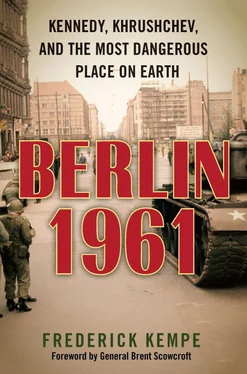A little more than a week after the uprising, Khrushchev masterminded the June 26 arrest of Beria. Among other charges, Khrushchev argued that Beria had been willing to abandon socialism altogether in a Germany that had been conquered at such great Soviet human cost during World War II. At the party plenary that sealed Beria’s fate and set in motion events that resulted in his execution, fellow communist leaders branded him as an unreliable socialist and called him a “filthy people’s enemy who should be expelled [from the party] and tried for treason.” It called his willingness to give up East German socialism a “direct capitulation to the imperialist forces.”
Khrushchev came away from the Beria experience with two lessons he would never forget. First, he had learned that political liberalization in East Germany could result in the country’s collapse. Second, he had seen that Soviet mistakes made in Berlin could end careers in Moscow. Three years later, in 1956, Khrushchev would grease his own rise to power by renouncing Stalinism’s criminal excesses at the 20th Party Congress. However, he would never forget the contradictory lesson that it was only Stalinist-style repression that had saved East Germany and allowed him to remove his most dangerous adversary.
In the first days following Khrushchev’s Palace of Sports speech, President Eisenhower chose not to respond publicly, hoping, as had happened so often in the past, that the Soviet leader’s bluster would not be accompanied by concrete action. Khrushchev, however, would not be ignored. Two weeks after the speech, on America’s Thanksgiving Day, he transformed his Berlin speech into an ultimatum that would require a U.S. response. He had softened some of his demands to gain his Presidium’s backing in a declaration delivered to the embassies of all interested governments.
Khrushchev backed off from his threat to immediately discard all Soviet obligations under the Potsdam agreement. Instead, he would give the West six months to negotiate with him before unilaterally altering the city’s status. At the same time, he fleshed out his plan to demilitarize and neutralize West Berlin in a manner that would leave it both outside the Soviet bloc and the West.
Khrushchev summoned U.S. correspondents, who were in their Moscow apartments carving Thanksgiving turkeys, to tell them about some knife-work he planned of his own. During his first press conference as premier, evidence itself of Berlin’s growing significance to him, Khrushchev told reporters, “West Berlin has turned into a sort of malignant tumor of fascism and revanchism. That’s why we decided to do some surgery.”
Referring to the text of the twenty-eight-page diplomatic note, Khrushchev told the correspondents that it had been thirteen years since the war had ended, and thus it was time to accept the reality of two German states. East Germany would never give up socialism, he said, nor would West Germany ever succeed in absorbing East Germany. Hence, he was giving Eisenhower a choice: within six months, he could negotiate a peace treaty that would demilitarize and neutralize West Berlin, or Moscow would act unilaterally to achieve the same outcome.
Khrushchev’s son Sergei, then twenty-three years old, worried that his father was giving Eisenhower no escape route from a collision course that could lead to nuclear conflict. He told his father that the Americans would never accept his proposed terms. Although Russians were known as chess players, Sergei knew that in this case—as in so many others—his impetuous father had not thought out his next move.
Khrushchev laughed off Sergei’s fears: “No one would start a war over Berlin,” he said. He told Sergei all he wanted was to “wring consent” out of the U.S. to start formal Berlin negotiations and preempt the exasperating diplomatic process of an “incessant exchange of notes, letters, declarations and speeches.”
Only by setting a tight deadline, Khrushchev told his son, could he move both sides toward an acceptable solution.
“What if we can’t find it?” Sergei asked.
“We’ll look for another way out,” Khrushchev said. “Something will always turn up.”
In answer to similar doubts posed by his longtime interpreter and foreign policy adviser, Oleg Troyanovsky, Khrushchev paraphrased Lenin when he explained that he planned to “engage in battle and then see what happens.”
KHRUSHCHEV’S KREMLIN OFFICE, MOSCOW
MONDAY, DECEMBER 1, 1958
A few days after Thanksgiving, during one of the most extraordinary meetings ever between a Soviet leader and an American politician, Khrushchev made clear that his Berlin ultimatum for the moment was far more about getting President Eisenhower’s attention than it was about altering Berlin’s status.
Giving him only a half hour’s notice, Khrushchev summoned visiting Minnesota Senator Hubert H. Humphrey to his Kremlin office for the longest meeting any American official or elected politician had ever had with any Soviet leader. Though scheduled for only an hour from three p.m., their talks ended just before midnight, after an eight-hour, twenty-five-minute exchange.
To show off his knowledge of matters American, Khrushchev expounded on the local politics of California, New York, and Humphrey’s home state of Minnesota. He joked about “the new McCarthy”—not anticommunist Joe but the left-of-center congressman Eugene, who would later run for president. He shared with Humphrey a secret “no American has heard of,” telling him of the successful test of a Soviet five-million-ton hydrogen bomb using only a tenth of the fissionable material previously required to produce an explosion of its magnitude. He also spoke about the development of a missile with a 9,000-mile range, for the first time sufficient to strike U.S. targets.
After asking Humphrey to name his native city, Khrushchev bounced to his feet and drew a bold blue circle around Minneapolis on a map of the United States hanging on his wall—“so that I don’t forget to order them to spare the city when the rockets fly.” Khrushchev struck Humphrey as a man infected with personal and national insecurity, “somebody who has risen from poverty and weakness to wealth and power but is never wholly confident of himself and his new status.”
In recounting his meeting the following day to Ambassador Thompson, so that the U.S. envoy could relay it to President Eisenhower, Humphrey said Khrushchev returned perhaps two dozen times to the matter of Berlin and his ultimatum, which the Soviet leader said had followed “many months of thought.” Humphrey concluded the chief purpose of their marathon meeting was “to impress him with the Soviet position on Berlin and to convey his words and thoughts to the President.”
Khrushchev wielded an arsenal of metaphors to describe the city. It was alternatively a cancer, a knot, a thorn, and a bone in his throat. He told Humphrey he intended to cough the bone loose by making West Berlin a “free city” that would be demilitarized and guaranteed by United Nations observers. To convince Humphrey he wasn’t trying to trick the U.S. into giving up West Berlin to communist control, he recalled at length how he had personally ordered the withdrawal of Soviet troops from Austria in 1955, thus ensuring its neutrality. Khrushchev told Humphrey that at the time he had argued to Foreign Minister Molotov that Russian troops were only useful in Austria if he intended to expand westward, and he didn’t want to do that. So, he said, “a neutral Austria was established and a source of conflict was removed.”
His argument was that Soviet behavior in Austria should serve for Eisenhower both as a model for West Berlin and as reassurance about its future. Because of that, he said, the U.S., Britain, and France had no need to leave any troops in Berlin. “Twenty-five thousand troops in Berlin are of no importance unless you want to make war,” he said in a calm voice. “Why do you maintain this thorn? A free city, a free Berlin, could lead to the breaking of the ice between the USSR and the USA.”
Читать дальше











